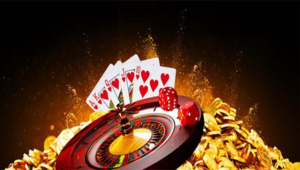The next time you visit your favourite casino, keep these five gambling tips and strategies in mind. If you win some money along the way, consider it a bonus. Smart gamblers know their primary objective is to have fun. That’s because the casino—or house—almost always has the edge. Still, it is possible to increase your odds of snagging a little do-re-mi from their coffers.
Know Your Limits
We know that money management can be a boring subject, and it can be difficult to keep track of your spending in the heat of casino action, but it’s imperative that you set a budget and stick to it. Make things easy on yourself and decide what you can afford to lose before you start playing. Which means this should be play money—not the money you set aside for housing, groceries, or other bills. Almost everyone budgets for weekly or monthly entertainment (movies, dinners out, a game of golf, etc.) and gambling is no exception. If you can’t afford to lose it, don’t play. And if you actually win, don’t be afraid to go home right then and there, money in hand. The casino will be open tomorrow, too.
Likewise, set time limits for your play, both per game and overall. Factor in time to take breaks, too, like having a drink or getting something to eat. Then, stick to your plan and leave the casino when your curfew comes, even if you feel like Cinderella. Your budget will dictate your time limit as well: If you blow through your play money in an hour, that’s it. Go home. Finally, in the heat of battle, fighting for chips or trying to outwit your poker opponents, a clear head is imperative. So watch your alcohol consumption. Any more than a single drink each hour is going to have a serious impact on your ability to gamble effectively. Set your limit and stick to it, or expect to go home broke.
Get the Most for Your Play
Getting the full value from your bets means taking advantage of whatever comps and freebies your casino offers. Make sure you have joined the player’s club to acquire comps and be sure to use your card every time you gamble, even if you are only playing for a few minutes. If you are playing at the table, use your card each time you sit down. Check in at the player’s club desk every time you visit and make sure to sign up for snail mail, email, and text notifications—that’s the best way to receive any special deals the casino might be offering. Even just a few new points could net you a free breakfast, qualify you for entry into a drawing, or earn you cash or a free gift. Almost every casino offers first-timers incentives like x-number of points and/or cash to sign up for their player’s card. So don’t be shy—you want to get the most bang for your buck. Getting full value can have a significant impact on your slot play as well. Many new slot machines allow you to play any number of credits, lines, and credits per line. But it can be confusing, so make sure you read the info screen to ascertain how you reach the bonus screen or top payout. Sometimes you simply can’t play full credits (Some machines take up to 750 credits for full play), but weigh your wagers against the top payouts.
Maximum payouts may not be your goal, but make sure you play enough credits to get to the bonus screen or you’ll miss the best part of the game. Likewise for video poker when it comes to max credits. You might want to take a few hours to play just one or two coins, but be advised that you can’t get the big royal-flush payout without at least five credits played (and often more). You won’t hit that royal very often, but that’s usually what people are aiming for.
Smile for the Cameras
Cameras, or the eye-in-the-sky in casino parlance, are just about everywhere in casinos these days. They are there to protect the house, but may also protect you if there is a dispute about a card shuffle or a payout. Keep in mind, though, that you don’t want to do anything foolish because Big Brother is always watching. Nor should you get a false sense of security when it comes to your personal belongings. These cameras might catch a thief on camera, but the perp will be long gone before the authorities have a chance to review the tapes. Be vigilant and always keep track of your purse, jacket, cellphone, etc.As for you turning the tables, casinos do not allow their customers to take photos while gambling or strolling through the property. If you and your buddies want to take a selfie after a big win, or you run into your poker hero and want to preserve the encounter for posterity, ask the casino manager or floor boss first.
Know Your Games
It’s surprising how few gamblers follow this rule, but knowing how to play the game before you place a bet will significantly improve your odds of having fun and scoring a win. If you don’t know how to play blackjack, why not brush up on the rules before risking your cash? After all, you wouldn’t offer to play Kobe Bryant a little one-on-one basketball for $1,000. If so, your odds of beating him are probably about the same as winning at a casino game you’ve never played or read about. Once you do know a little about a new game, keep in mind that the main bet (such as pass line at craps, banker bet at baccarat, ante bet at Three Card Poker) has the smallest house edge. The extra, or bonus bets, are the killers. Most bonus bets have a house edge that is five-times higher. For instance, the pass line bet at craps has a house edge of 1.44 percent, but betting on an 11 has a house edge of 11.11 percent (sometimes even as high as 16.6 percent). Did you know that the average blackjack player plays at about a 2 percent disadvantage to the house? It’s true, but the Lucky Ladies side bet has a house advantage of 25 percent. Ouch!
Don’t Let the Taxman Scare You
Gambling income is taxable income. Depending on how much you win, the casino will either withhold taxes (a flat 25–28 percent) before paying you out, or you’ll have to report them to the IRS come tax time. For winnings over a certain amount (which depends on the game you were playing) the casino will also present you with a W-2G, a form that denotes the number of your winnings and what, if any, taxes were taken out. To make sure you are doing everything on the up and up, keep a diary outlining how much you spend, how much you win, and how much you lose, for every visit you make to a casino. If your winnings are small, $25 here, $500 there, you’ll still need to report them at the end of the year—and having the diary will help you in case of an audit. If you suffered a net loss for the year, this will be deductible. Either way, keeping a diary is the only way to know whether or not you have to send Uncle Sam his share.









